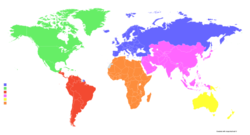| European Youth Olympic Festival |
|---|
| |
| Editions |
Summer Winter |
| Sports |
Summer
Winter |
Handball has featured as a sport at the European Youth Summer Olympic Festival since its fourth edition in 1997. It has appeared on the programme at every subsequent edition of the biennial multi-sport event.
